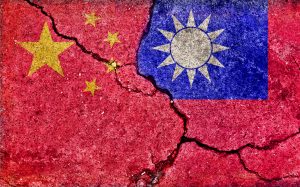On January 13, the world watched closely as Taiwan went to the polls to elect its new president. The victory of Lai Ching-te, also known as William Lai, of the incumbent Democratic Progressive Party (DPP) suggests a degree of continuity in the island’s foreign policy postures towards its neighbors and traditional partners.
Despite Lai’s victory, however, the Kuomintang won more seats in Taiwan’s parliament, although neither party was able to secure an outright majority on its own. This means that the parliament will be able to hinder the president’s agenda and vice-versa. However, Lai has pledged to cooperate with the Kuomintang in order to take forward policies that benefit Taiwan as a whole.
As expected, the People’s Republic of China (PRC) reacted negatively to the DPP’s victory. Chinese Foreign Minister Wang Yi made it clear that the election result will not change the “basic fact” that Taiwan is a part of China. Conversely, U.S. Secretary of State Antony Blinken congratulated Lai on the victory, while President Joe Biden clearly stated that the U.S. does not support Taiwan’s independence. Other countries, such as the United Kingdom, Japan, and other allies of Taiwan issued congratulatory statements to Lai after the election race.
Closer to hand, Southeast Asian countries exhibited a range of positions toward the election. For instance, Cambodia’s Foreign Ministry and the ruling Cambodian People’s Party both stressed their support for Beijing’s “One China Principle,” which holds that there is one China, including Taiwan, of which the PRC is the legal government, as did Myanmar’s military junta. Vietnam took much the same stance, though it did say that it would maintain “non-governmental relations” with Taipei. Indonesia said it will continue to support Beijing’s “One China Principle,” recognizing the PRC as the sole legal representative of the one China.
At the other end of the spectrum, Singapore and, most vocally, Philippine President Ferdinand Marcos Jr. offered their congratulations for Lai Ching-te’s presidential victory. The Philippines said that this was consistent with its own “One China Policy,” which recognizes the PRC as the official government of Beijing but maintains unofficial ties with Taiwan, while also encouraging Beijing and Taipei to settle their differences through peaceful means. But the Chinese government denounced Marcos’ congratulatory message as a violation of its “One China Principle.” Beijing summoned the Philippine ambassador to explain and re-evaluate its posture towards Taipei and urged the country not to “interfere” in Beijing’s “internal affairs.”
Notably, Thailand, Laos, Malaysia, and Brunei did not react publicly to the election at all, reflecting the sensitivity of the issue for a region that enjoys productive economic relations with both Taiwan and the PRC.
Taiwan and Southeast Asia have strong economic ties, with two-way trade totaling more than $70 billion in 2021, more than 98 percent of which was with Indonesia, Malaysia, Singapore, Thailand, Vietnam, and the Philippines. The trade is dominated by electronics, machinery, plastics, chemicals, agricultural products, and textiles. Furthermore, the Taiwan Strait acts as a vital artery for global shipping, carrying over 80 percent of the world’s largest vessels and more than 40 percent of container traffic. Hence, whatever happens in the Taiwan Strait is likely to have economic ramifications in Southeast Asia.
At the same time, Southeast Asia also has strong economic ties with the PRC. Total trade between the two sides was close to $1 trillion in 2022, and both sides have pledged to boost this further in the near future. Add to this China’s importance as a source of investment and official development assistance and it is clear that Beijing is vital to the region’s future economic prosperity.
However, in order to maintain transactional benefits from both Beijing and Taipei, it is in Southeast Asian states’ interest to refrain from being overreactive – overly supportive or overly opposed – on Taiwan in general, and its election in particular. Being overly supportive of Taiwan might be interpreted in Beijing as a violation of its “One China Principle” and could jeopardize and complicate future relations. This might eventually turn the region into a geopolitical chessboard in which China and the U.S. compete for dominance, rather than the balance that the region tends to prefer.
Conversely, overt public support of Beijing’s “One China Principle” could be interpreted by the world’s democracies as an objection to Taiwan’s democratic progress and a signal of alignment with the PRC. This approach has already been taken by a number of states following this month’s election, such as Nauru, which took the opportunity to cut off relations with Taipei and establish them with Beijing.
For Southeast Asian nations, an overreaction in either direction could create additional constraints on top of the other issues currently facing the region, such as the Myanmar crisis and the disputes in the South China Sea. It would also likely further undermine the unity of the Association of Southeast Asian Nations (ASEAN), which has been strained by these crises. The states in the region should remain astute and judicious regarding the situation in Taiwan, given Southeast Asia’s proximity to the Taiwan Strait.
In the long run, ASEAN as a regional institution will have to be prepared for a potential conflict in the Taiwan Strait, if for no other reason than to minimize its impact. But it also has interests in creating a consensual decision-making mechanism to forge a unified regional position on the cross-Strait conflict. ASEAN should also advocate peaceful and diplomatic conflict resolution in order to communicate its neutrality and avoid being perceived negatively by any major powers.
It is still too early to make any assumptions about the impact of Lai’s election on cross-Strait relations, or on how the relations between Taiwan and Southeast Asia will unfold. However, Southeast Asia will feel the impact of whatever happens in the Taiwan Strait in the years to come. If this is the case, preparation is the best approach for the bloc in both the short and long run.

































